Seagate's Momentus XT Reviewed, Finally a Good Hybrid HDD
by Anand Lal Shimpi on May 24, 2010 9:31 AM EST- Posted in
- Storage
- SSDs
- Seagate
- Momentus XT
- Hybrid Drive
- SSHDs
Overall System Performance using PCMark Vantage
Next up is PCMark Vantage, another system-wide performance suite. For those of you who aren’t familiar with PCMark Vantage, it ends up being the most real-world-like hard drive test I can come up with. It runs things like application launches, file searches, web browsing, contacts searching, video playback, photo editing and other completely mundane but real-world tasks. I’ve described the benchmark in great detail before but if you’d like to read up on what it does in particular, take a look at Futuremark’s whitepaper on the benchmark; it’s not perfect, but it’s good enough to be a member of a comprehensive storage benchmark suite. Any performance impacts here would most likely be reflected in the real world.
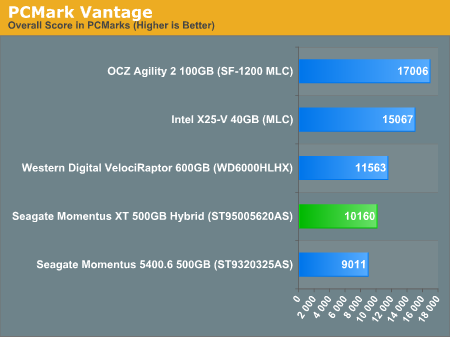
The PCMark Vantage Suite puts the Momentus XT smack in the middle of the 5400.6 and the VelociRaptor. The individual suites generally tell a similar story, although in some cases the drive actually outperforms the VelociRaptor.
The memories suite includes a test involving importing pictures into Windows Photo Gallery and editing them, a fairly benign task that easily falls into the category of being very influenced by disk performance.
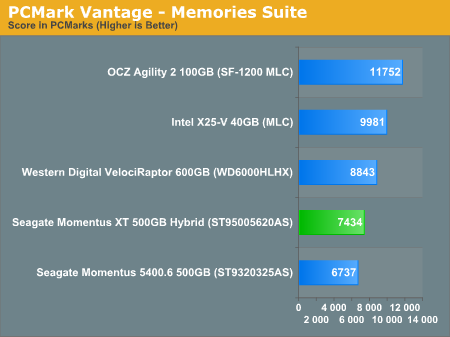
The TV and Movies tests focus on on video transcoding which is mostly CPU bound, but one of the tests involves Windows Media Center which tends to be disk bound.
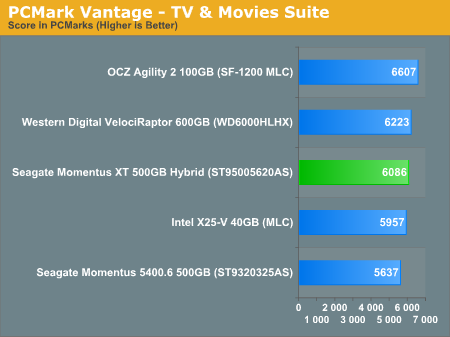
The gaming tests are very well suited to SSDs since they spend a good portion of their time focusing on reading textures and loading level data. All of the SSDs dominate here, but as you'll see later on in my gaming tests the benefits of an SSD really vary depending on the game. Take these results as a best case scenario of what can happen, not the norm.
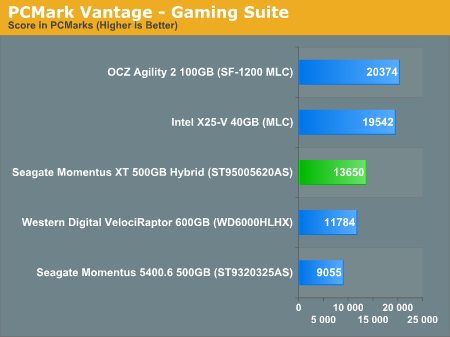
In the Music suite the main test is a multitasking scenario: the test simulates surfing the web in IE7, transcoding an audio file and adding music to Windows Media Player (the most disk intensive portion of the test).

The Communications suite is made up of two tests, both involving light multitasking. The first test simulates data encryption/decryption while running message rules in Windows Mail. The second test simulates web surfing (including opening/closing tabs) in IE7, data decryption and running Windows Defender.
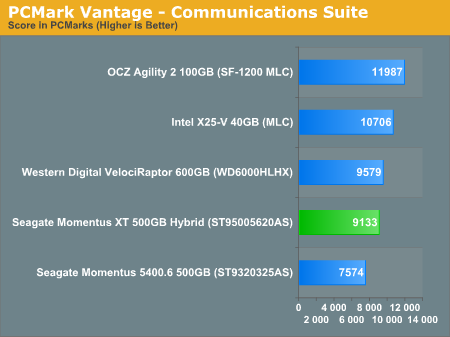
I love PCMark's Productivity test; in this test there are four tasks going on at once, searching through Windows contacts, searching through Windows Mail, browsing multiple webpages in IE7 and loading applications. This is as real world of a scenario as you get and it happens to be representative of one of the most frustrating HDD usage models - trying to do multiple things at once. There's nothing more annoying than trying to launch a simple application while you're doing other things in the background and have the load take forever.
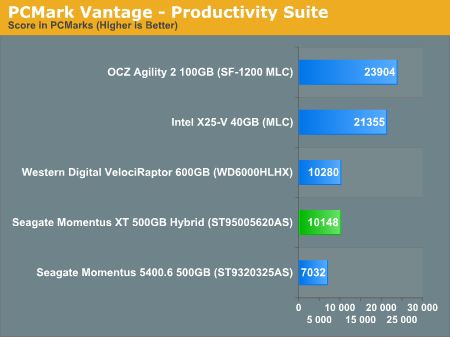
The final PCMark Vantage suite is HDD specific and this is where you'll see the biggest differences between the drives:
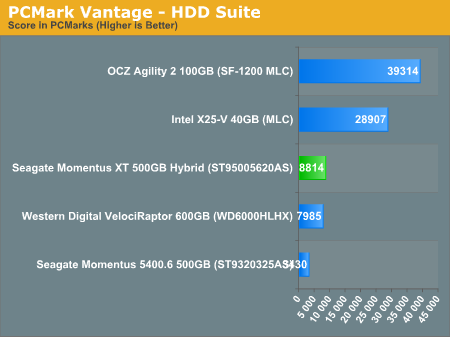










120 Comments
View All Comments
dannysauer - Saturday, July 2, 2011 - link
That's a terrible metaphor. A "100 shot" of nitrous is called a "100 shot" because it's good for 100 horsepower. Dyno tests on properly tuned vehicles repeatedly confirm that the advertised power change is usually within a few HP of the documentation.Now that I think about it, I guess it's inadvertently a good metaphor for poorly understanding technology. :)
In any event, you have a good point that it's deceptive to market this as a "hybrid". It's just a regular drive with a large intelligent cache. They should just say "now! with adaptive caching!" or something.
Chloiber - Monday, May 24, 2010 - link
In the beginning you said you would use a Patriot Inferno, but on most benchmarks it says "Agility 2" ?!OT:
This drive should be a perfect upgrade for all notebook users who think SSDs are too expensive or who need more space than the usual 40-120GB of SSDs.
Anand Lal Shimpi - Monday, May 24, 2010 - link
I only used the Inferno for the new tests, the rest was existing data pulled out of Bench. However the two drives perform the same, they are both SF-1200 based 100GB drives with production firmware :)Take care,
Anand
Chloiber - Monday, May 24, 2010 - link
Ah, no problem then, thought it's a copy&paste error :)Aikouka - Monday, May 24, 2010 - link
What I'm curious about is how this drive handles regularly used files that change somewhat often. Caching can be great for executables or libraries (DLLs, etc), given that they don't change often if at all. But what happens when you have files that are accessed during a specific task that may change every time you perform this task? You said that the algorithm doesn't work with writes, which if it understood what write was coming in, it could intercept and possibly alter the already cached data to the new value.This mostly came from a nerdy WoW example where while textures and such don't normally change too often, add-on settings can possibly change every time you load the game (and load-up can be pretty ardruous with a lot of add-ons). So, if these settings files are changing possibly every time, the cache values will be out of date and it'll have to use its poor Random Read rate to access the proper data.
It's really just one drop in the bucket of the many examples you can think of where this drive wouldn't have a problem, but start-up time in WoW is one of the reasons why I went with the Intel X25-M to begin with... when I bought it, it was pretty much top notch in random read performance.
Anand Lal Shimpi - Monday, May 24, 2010 - link
As is the case with any cache there has to be some mechanism to invalidate data in the cache if the original data is modified. I believe that's what happens here. There's a table of LBAs that are cached and if one is modified then the cached version is immediately invalidated and/or updated.Take care,
Anand
Aikouka - Monday, May 24, 2010 - link
Definitely true with cache invalidating.I think I was reading a bit too far into this line:
"the Momentus XT however, the SLC NAND acts exclusively as a read cache - writes never touch the NAND."
and considering that it meant that the caching wouldn't access incoming writes for validating cached data. It sounded odd that way as it'd make caching an absolute sleeping bear of a problem. I'm assuming the statement is meant to be taken literally -- the drive simply doesn't write cache to help speed up writes.
Thanks for the clarification on a sleepy Monday morning and bienvendo!
siberian 3 - Monday, May 24, 2010 - link
Hi Anand do we know what will happen if the NAND fail and not the mechanical part of the drive?Will the user lose the DATA it is on the drive
jaydee - Monday, May 24, 2010 - link
Anand, how do you think this would compare if they chose to do, say 8GB of MLC instead of 4GB of SLC? Surely it would bring the cost down, and I would think the double cache would be more important than the decrease in speed?Chloiber - Monday, May 24, 2010 - link
It has also something to do with reliability/lifetime, not just performance.